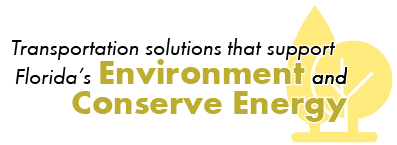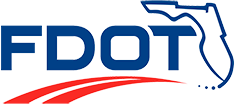Florida Transportation Plan (FTP)
Economic Competitiveness / Quality Places / Environment & Energy

Objectives
Plan and develop transportation systems and facilities in a manner that protects, and where feasible, restores the function and character of the natural environment and avoids or minimizes adverse environmental impacts
Decrease transportation-related air quality pollutants and greenhouse gas emissions
Increase the energy efficiency of transportation
Increase the diversity of transportation-related energy sources, with emphasis on cleaner and more efficient fuels
Implementation Actions
Continue to strengthen coordination between transportation planning and environmental planning
Key Partners Include:
- Florida DOT
- Florida Department of Environmental Protection
- Florida Fish and Wildlife Conservation Commission
- Florida Department of Agriculture and Consumer Services
- Water management districts
- The Nature Conservancy
- 1000 Friends of Florida
- Audubon of Florida
- Defenders of Wildlife
- Environmental partners
Address conservation and recreation lands, wildlife habitat corridors, water quantity and quality, air quality including greenhouse gas emissions, risks from extreme weather events and other environmental conditions, noise, and related issues at appropriate points in the planning process. Develop guidelines to institutionalize linkages among plans and processes, including identification and consideration of smokesheds from controlled burns.
Develop advanced, large-scale approaches to environmental mitigation that accomplish transportation and environmental stewardship goals together, such as coordination on land purchases and easements and water storage, treatment, and drainage. Consider public/private partnership opportunities and identify national best practices and potential approaches to implement these practices in Florida.
This Implementation Action supports the following FTP objectives:
- Plan and develop transportation systems and facilities in a manner that protects, and where feasible, restores the function and character of the natural environment and avoids or minimizes adverse environmental impacts
- Decrease transportation-related air quality pollutants and greenhouse gas emissions
Key Partners Include:
- Florida DOT
- Florida Department of Environmental Protection
- Metropolitan Planning Organization Advisory Council
- Modal partners
Strategies may include more efficient system operations and management, more efficient coordination of transportation and land use decisions, and expanded modal choices.
This Implementation Action supports the following FTP objectives:
- Decrease transportation-related air quality pollutants and greenhouse gas emissions
- Increase the energy efficiency of transportation
- Increase the diversity of transportation-related energy sources, with emphasis on cleaner and more efficient fuels
Support use of LNG/CNG, electric vehicles, and other clean fuels on the transportation system
Key Partners Include:
- Florida DOT
- Florida Department of Environmental Protection
- Florida Department of Agriculture and Consumer Services
- Metropolitan Planning Organization Advisory Council
- Modal partners
Strategies may include policy and regulatory changes, infrastructure modifications to accommodate alternative fueled vehicles, and collaboration with the private sector and other states.
This Implementation Action supports the following FTP objectives:
- Plan and develop transportation systems and facilities in a manner that protects, and where feasible, restores the function and character of the natural environment and avoids or minimizes adverse environmental impacts
- Decrease transportation-related air quality pollutants and greenhouse gas emissions
- Increase the energy efficiency of transportation
- Increase the diversity of transportation-related energy sources, with emphasis on cleaner and more efficient fuels

